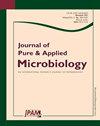波兰成年人对军团病的认识、认知和态度
IF 0.6
Q4 MICROBIOLOGY
引用次数: 0
摘要
尽管军团病在波兰和全世界日益流行,但公众对这种疾病的严重性和适当的预防措施的认识程度却知之甚少。这项工作的目的是评估波兰成年人对军团病及其病原体、危险因素、暴露和其他相关事实的知识、观念和信念。这项横断面研究的数据是通过调查问卷收集的,调查问卷在调查开始前由研究人员构建并验证,调查持续时间为2022年1月至3月。对军团菌的知识、态度和行为进行测量和量化。采用单因素方差分析和卡方检验比较人口统计变量与知识水平之间的关系。通过回归分析,对研究对象的知识水平进行预测。本研究共纳入251名参与者,平均年龄28.26±9.6岁。超过三分之二(74%)是受过高等教育的女性(62%)。年龄越大,军团菌病知识越少(B = -0.049, p < 0.001),学历越高,军团菌病知识越多(B = 1.656, p < 0.001)。性别间无显著差异(p = 0.066)。军团菌诊断检测方面存在知识缺口。另一方面,研究参与者对预防程序的了解程度相当高。这项研究表明,波兰成年人对军团菌病的总体认识相当低。特别是老年群体和受教育程度较低的群体需要提高对军团病的认识。在如何诊断该疾病方面尤其存在知识差距。包含简单易懂信息的提高认识运动可能有助于防治这种疾病。本文章由计算机程序翻译,如有差异,请以英文原文为准。
Polish Adults’ Knowledge, Perceptions and Attitudes Concerning Legionellosis
Despite the growing prevalence of legionellosis in Poland and worldwide, little is known about the extent of public awareness regarding the seriousness of this disease and the appropriate preventive measures. The aim of this work is to assess the Polish adults’ knowledge, perceptions, and beliefs about legionellosis and its causative agents, risk factors, exposure, and other relevant facts. Data for this cross-sectional study were gathered via a questionnaire that was constructed and validated by the study investigators before commencing the survey, which lasted from January to March 2022. Knowledge, attitude and practice towards legionella were measured and quantified. One-way ANOVA and chi square tests were used to compare between demographic variables and the level of knowledge. Regression analysis was conducted to examine the predictors for higher knowledge among study participants. A total of 251 participants with a mean age of 28.26 ± 9.6 were enrolled in the current study. Over two thirds (74%) were females, with higher education (62%). Older age was associated with less knowledge about legionellosis (B = -0.049, p < 0.001), while higher education was associated with more knowledge (B = 1.656, p < 0.001). No significant differences were found between genders (p = 0.066). A knowledge gap was present for diagnostic tests regarding legionella. On the other hand, knowledge about prevention procedures was quite high among study participants. This study showed that overall knowledge about legionellosis in Polish adults was quite low. In particular, older age groups and the less educated are in need of more awareness of legionellosis disease. A knowledge gap was particularly present regarding how the disease is diagnosed. Awareness campaigns containing simple, easy-to-understand information could prove useful in combating the disease.
求助全文
通过发布文献求助,成功后即可免费获取论文全文。
去求助
来源期刊

Journal of Pure and Applied Microbiology
BIOTECHNOLOGY & APPLIED MICROBIOLOGY-MICROBIOLOGY
CiteScore
2.00
自引率
0.00%
发文量
266
审稿时长
11 months
期刊介绍:
Journal of Pure and Applied Microbiology (JPAM) is a peer-reviewed, open access international journal of microbiology aims to advance and disseminate research among scientists, academics, clinicians and microbiologists around the world. JPAM publishes high-quality research in all aspects of microbiology in both online and print form on quarterly basis.
 求助内容:
求助内容: 应助结果提醒方式:
应助结果提醒方式:


